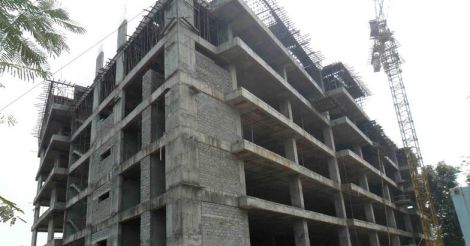Visitors to Infopark at Koratty will be surprised to see the beautiful campus. Instead of usual huge buildings made of glass and steel one will find small buildings in the campus. However, if you think it is the latest trend you will be mistaken as it the same township which was built for British company JB Coats. Now cosmetic changes have been given to the buildings for starting the infopark.
A step into interiors of the park will give you an idea of how industrial townships across the world in the 1960s and 70s looked like. Huge bungalows for manager, schools, servant quarters and sprawling 10,000 square feet club house with provision for bar, snooker room, tennis court and swimming pool. The well laid concrete roads and excellent drainage facilities are signs of luxurious life style of those times.
Many companies had similar townships in many parts of Kerala. A beautiful lake surrounded by club houses and bungalows are seen not only at FACT in Kochi but also at Alind, in Kundara. Mavoor Gwalior Rayons in the private sector and Tatas also had similar culture and township in Kerala. The townships were maintained by the companies. Parties and celebrations were the norm. The townships had theatres and some even had places of worships and public parks. Those who lived in these townships were indeed fortunate as such was quality of life offered by companies.
Salaries? The companies paid their employees nearly twice as much as that was given by the State Government. If the salary for government employee in the 1960s was in the range of Rs 300 to Rs 400, the companies gave Rs 600 to Rs 800 to its employees. Six months salary was given as bonus. No wonder people were jealous with company employees.
If today, changes were made within months, it was very slow during those times. The phenomena of disruption which makes wholesome changes quickly now was not prevalent then. It took centuries for townships and big companies to collapse. Companies like Tata which embraced changes still survive while others closed down or still living like dead.
Who said that there is no land in Kerala to start industries? There are many industrial areas in Kerala which are lying unused. In FACT 1500 acres are lying unused. There are thousands of acres of land which was lying unused in many companies across Kerala here is no point in holding on to the unused land and it should be properly utilized. The ultilisation of land has changed according to the passage of time. The government should encourage new industrial ventures to function from premises of old companies instead of being particular that only similar ventures can function from land of closed down companies.
JB Coats became Madura Coats and later Vyga Threads and now it has become Infopark. And it will become another company in future. If the land of Vyga Threads was allowed to be infested by weeds and wild grass, the Infopark in Thrissur would not have materialized. The fact that the company was in private sector made things easier for the State Government to take over the land. But had it been in the public sector, the trade unions would have raised objections saying land was company’s property and would have scuttled it.
Over the years, forest had made way for agriculture land and plantations. Crops in plantations can change and later these may become industrial areas and after many years may become part of the city. In Mumbai, the land which used to house closed down jute mills have now become huge residential complexes and shopping malls. The land is thus utilized for making huge transformations.
The rubber plantations under Plantation Corporations are now used for growing fashion fruits and for rearing buffaloes and goats. If plantations leased out for growing coffee, tea, cardamom can be used for diary farming and for growing other agriculture products and for home stays then it will change the fortunes of the companies and its employees. The State will also benefit from this move.
Among townships, the biggest is the magnificent Jamshedpur on the banks of river Subarnarekha. It is now known as Tatanagar. The Tata Steel Company has taken good care of the city with its good schools and hospitals. However, if when one crosses the bridge to enter the pig infested streets of Bihar on the other side, one will realize the Tata’s efficiency and its magnanimity.


























Disclaimer
The comments posted here/below/in the given space are not on behalf of Manorama. The person posting the comment will be in sole ownership of its responsibility. According to the central government's IT rules, obscene or offensive statement made against a person, religion, community or nation is a punishable offense, and legal action would be taken against people who indulge in such activities.